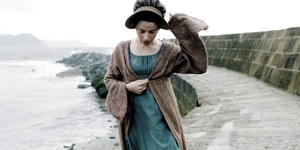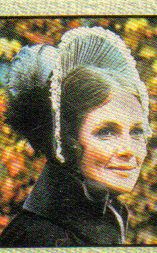Ellen and Jim Have a Blog, Too
We are two part-time academics. Ellen teaches in the English department and Jim in the IT program at George Mason University.


A new great adaptation: _The Compleat Persuasion_ 2007 · 3 April 07
Dear Harriet,
The earliest reports on this year’s ITV Persuasion, directed by Adrian Shergold, screenplay by Simon Burke, starring Sally Hawkins as Anne Elliot and Rupert Penry-Jones (perhaps remembered from Gillian Armstrong’s Charlotte Gray, with Cate Blanchett and Michael Gambon) as Captain Wentworth.
First, Nick:
“Once again I stress that I am judging this as a film rather than an adaptation; and as a film it was in a different class to the NA and MP productions. Indeed my initial judgement would be that this was the best Austen film I have seen. The superiority was evident from the very first shot: a wonderful long tracking shot of Anne walking through the house as the furniture was packed up or covered with sheets. Quite wordless but conveying a spirit of melancholy and also of Anne’s essential isolation through cinematic means.
And this set the tone of the whole film which was full of shots of extraordinary impact. Two which especially come to mind: one of Anne looking out of a window between two vases of flowers, staggering in its beauty; and one of the assembly rooms at Bath shot in a white light so glaring that nothing except the people strutting their stuff could be seen.
This film really used a visual language. I am not sure if this was down to the writer (Simon Burke) or Director (Adrian Shergold). I would guess the latter, who has been working in television for a long time. He directed one of my absolutely favourite comedy series (Early Doors).
This was a dark, hard adaptation. Anne’s pain, her isolation,
the way she is mis-treated and ignored by father, sisters, all, were brought home in a way which made it painful to watch at times.
The film managed its limited time miraculously and it did so by shooting the two parts of the story in quite different ways. So the comic or satiric elements were shot with a fair amount of speed, with a broad brush. No doubt this means that many of Austen’s nuances were lost, but you can convey selfishness, greed, ignorance, stupidity, cupidity, falseness with a broad brush. On the other hand, the central story of Anne and Wentworth was conveyed quite slowly (until an extraordinary climactic ending) there were repeated shots of Anne writing in her diary for instance.
And, as Anne Elliot, Sally Hawkins gave a performance of quite extraordinary restrained power. Unfortunately I can’t (again) find any stills. [But I have one, Harriet]
2007 Persuasion, Sally Hawkins as Anne Elliot
This film, unlike the other two [MP and NA] really drew you into the story so that the happy ending worked ; that is you really cared and really exulted. Having read what you say about Davies and his distanced view (about which I think you are wholly right) the difference here is clear. There was no irony here. Satire of most of the characters yes. But absolutely no irony as regards the central love story; it was played dead straight and therefore it worked. I was very close to tears, which should always be the acid test of a good happy ending.
And this was achieved, let it be said, with absolutely no sexualisation. Sex other than in the eye contact of the two
central characters (and Shergold was not afraid of extreme close-up which can work so well on television) was non-existent until they kiss near the end. Much use was made of letters (and voice-over) which I am sure you would be able to analyse.
All in all this was in a different class to the other two films in the season. It is the only one which I really want to see again. Terrific.”
Judy concurred with one demur:
“Just quickly, yes, in the main I agree with Nick. I think this one is in a different class from either of the other films – it ‘feels’ more like a feature film than the others, looks beautiful and is suffused with melancholy.
It also uses a lot of Austen’s actual words and for me has more period feeling. It feels more expensive as a production, too, with location filming in Lyme (a very windswept Lyme) and Bath,
rather than Dublin standing in this time.:) I do like the older
version with Ciaran Hinds and Amanda Root too, but am now wondering if I might prefer this one. The music is also perfectly woven in and expresses Anne’s emotions.
I do have some reservations about the last 20 minutes or so, when I think it starts to feel rushed and indeed there is a scene of Anne running through the streets – but, apart from that, I love it. Sally Hawkins is astonishing as Anne, such a quiet and understated performance and yet so compelling.
I think Nick’s insight about the two different paces for the different elements of this adaptation is brilliant and just right: yes, the film flashes through the satire but lingers over the love story.
ITV showed a “behind the scenes” documentary about the making of the three new films last night – I’ll include this on your video tape although I know you are sceptical about these offerings!”
Dear Harriet, I now have in hand the new MP which I mean to watch today and the new NA which I shall save for Friday. I can hardly wait to see this new Persuasion. I’ve loved the novel for so long; it is, along with Northanger Abbey a novel I read during my “lost” two years, and Jim brought it to the hospital to me to keep by my side in ICU (Intensive Care Unit) when I suffered my two worst hemmorhages.
To be fair, a friend on Eighteenth Century Worlds, Arnie, said the reports he got condemned the film. I wrote on list to thank him for his comments on the latest NA and Austen’s own book, and he replied:
Me. Thank you, Arnie. Early reports on the latest Persuasion suggest it’s better than the 1995 one, is indeed excellent. We’ll be hearing more about this one I expect.
Arnie. From what I hear, it is the opposite, an outrageously hubristic altering of the novel, cutting out significant details, adding anomalous others.
I’m among those who don’t use literal fidelity as a sole criteria; sometimes I feel (with Nick) that the production which errs on the side of daring and then doesn’t succeed can be more interesting than the conventional safe “faithful” adaptation. But Arnie made some astute remarks on the 1971 BBC Persuasion, which movie I’ve written about here, and which is so rarely discussed, much less adequately that I want to include his words in my letter to you on this making of a Compleat Persuasion:
“It so happens that I have just gotten through watching the 1971 BBC Persuasion, which you wrote about in this list over a month ago (I just checked!), and I must say how much I agree with what you wrote about it. I loved that 1971 version, to my very great and pleasant surprise.
Ann Firbank indeed was amazing as Anne, and so (in a much less macho way than Ciaran Hinds) was the actor who played Wentworth. Most important, the screenwriting was brilliant. Julian Mitchell was wise enough to not tamper with JA’s dialog. When dialog was in the novel, it was in the film, I found, over and over and over again. That is indeed leaving well enough alone, why
tamper with perfection?
And when there was only narration in the novel, Mitchell did an exceptional job of creating Austen-like dialog, particularly in the Bath music recital scene near the end. Mitchell was only 35 at the time, I am really impressed at how well he did. Davies is his equal, but Davies takes more liberties, and I find myself wanting more adherence to the text, as the years go by.
And I really loved the 1995 version, and still will, but now I know that if I want the Compleat Persuasion, I need to go back to the 1971 version.”
Arnie’s comment on the non-macho actor chosen for the 1971 Persuasion (Bryan Marshall) is perceptive. I like the older types very much too, but I’ll take a different stance here for the sake of bringing out what the new choices add:
It seems to me from the mid-1990s on, particularly the 1995 P&P which so famously starred Colin Firth as Darcy, in the more effective Austen films what the film-makers have done in order to inject a large dose of heterosexual male hegemony into these Austen movies is deliberately choose an actor for the main hero role whose psychological baggage is the opposite of ethical gentleman: Mark Strong played torturers and was made Mr Knightley; Colin Firth played repressed and agonized but aggressively imaginatively sexual men and was made Darcy; Jeremy Northam is a subversively effeminate sexualized male (gay); Ciarhan Hinds was a rough type, and became Wentworth; Harold Pinter is often a cold menacing type in his films; MacFayden is a damned Heathcliff cad; Penry-Jones looks like like the kind of male chosen for perversely cruel villains.
Uniformly in the 1970s adaptations of high status novels the kinds of males chosen were matinee idol types, sensitive gentleman, fatherly, at most some came from spy stories where they did some police action (Philip Latham who plays Plantagenet Palliser in the 1970s series from Trollope’s great second cycle of political novels) or are people who have enacted outsider political roles (Donal McCann for Phineas Finn, who was an extraordinary Gabriel in John Huston’s film adaptation of Joyce’s “The Dead”).
These new macho brutal male types inject into the Austen canon the codes of action-adventure thrillers, spy and horror films, politically subversive ones. And they do endow them with intense power and allure. The frisson is particularly intense when they chose a sensitive male to play the secondary roles (Colonel Brandon, Edmund Bertram) and keep the women in the typology of repressed hurt high intelligence and ethics, as in this still of Ann Firbank looking up with a hope of joy for the first time in 8 long years:
1971 Persuasion, Ann Firbank as Anne Elliot
Or consider Billie Piper as Fanny Price, a bit too young to convey a fully distraught moment, but getting there:
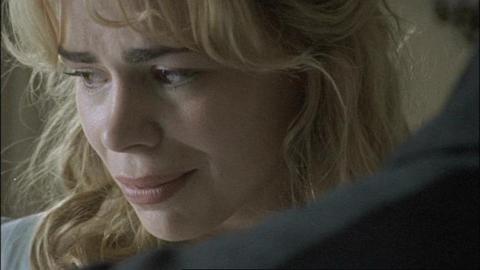
On the filming on location this time: Judy helped me find some stills, and it seems that the choice was made to film Lyme as a stormy, wild, dark place.
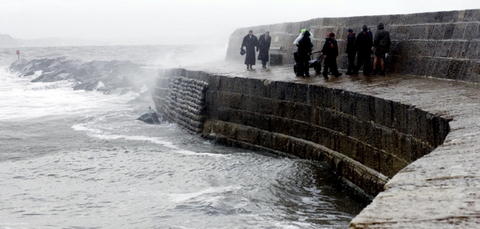
2007 Persuasion, the Cobb
As I recall in the BBC 1971 Persuasion Lyme was a quiet place, not so stormy. I remember scenes of beautiful flowers in the country walk—a long country walk. It seems somehow right “for our times” that the crew goes out to film on a dark fall (?) day. Very effective—or they use computers and make it look stormy.
Have you been to the Cobb, Harriet? I have once, and Jim and I even climbed that stairway. You can. We guessed which one it was. There were a couple as I recall. The stairway in both the 1971 and 1995 looks bigger, less fragile than this latest one:
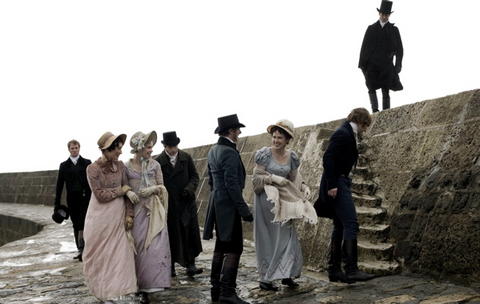
This translates Austen’s idea in Persuasion about the fragility of people against time, nature, loss, aging, death. The retrieval at its close is all the more precious.
But I must run away now if I’m to get to the first of my three new films.
Sylvia
--
Posted by: Ellen
* * *
Comment
- Quickly on Lyme. I watched the ‘behind-the-scenes’ documentary which Judy talks about last night; there was a good deal of fluff and little substance (particularly where NA was concerned – so they used it as an excuse to show the bath – small b – scene again). But it was interesting about Lyme. There were certainly no computer generated effects. It was a very stormy day when they shot; indeed the shots in the documentary showed that the film toned down the storminess.
Here we get into an interesting consideration of the effects of budgets and other real constraints on the film-making process. With a bigger budget they might have waited for a less stormy day. However I felt it worked well. Of course they were shooting scenes which were quite unconnected in film-time on the same day.
Your remarks on casting are fascinating, Ellen, because Penry-Jones is known in the UK for playing an action hero in the spy series Spooks. It does strike me though that there is an element to Wentworth which makes this applicable to him in a way which it is not to other Austen heroes – we should believe that he is capable of amassing a fortune by derring-do or imperialist thuggery (take your pick or best of all land somewhere in-between :)). This production did not consider this matter (I do not recall any Persuasion production having done so? It would of course require a Rozema type make-over to show this accumulation of wealth) but we should believe in Wentworth as a man of action (I am being polite).
In one other way casting went against type with Anthony Head playing Anne’s father; Head is, and I guess always will be, best known as Buffy’s mentor. He gave a little gem of a performance here (though one should say that it is a gem of a role!).
I understand what Judy means about the last twenty minutes but I felt this was intentional (I may be quite wrong and it was just time-constraints) – there were repeated scenes where the climax was delayed. It sort of ties in to what you say about the fragility of people against time in Austen, Ellen. But there was also a certain sense in this film that ‘hell is other people’.
— Nick Apr 3, 11:22am # - Hi, I stumbled across your entry, through my Jeremy Northam Google Alert, and was interested to read your rather brief but puzzling assessment of the kind of roles he’s played. “Jeremy Northam is a subversively effeminate sexualized male (gay)...” I’ve seen most of Mr. Northam’s films, and I can’t say that I’ve seen any of the roles he played before Mr. Knightley as being described in that fashion. Perhaps you could elaborate more fully?
— Elizabeth Apr 4, 4:30am # - Are you a fan of Northam’s? I must suppose so from the page you have set up. It seems to me my words have a clear meaning. I left it to you to understand why others have not talked about the gay subtext of Northam’s type-casting. Homophobia? Discomfort with their own sexual response & unwillingness to be candid? I find him intensely alluring.
In sexual type Northam even looks like Cary Grant; in his “brotherly” non-threatening presence he repeats the frissons of Ronald Colman and Dirk Bogarde.
E.M.
— Elinor Apr 4, 9:21am # - Brief response to Nick,
It matters very much what kind of male is chosen for these films: whether macho male or gentlemanly. I’m not talking about individual acting performances but rather how these films function in women’s dream lives. . I think in much of Austen hell is other people. That was D. W. Harding's take on her oeuvre in general.
— Sylvia Apr 4, 3:54pm #
commenting closed for this article

